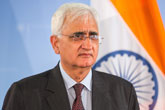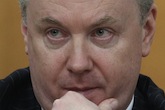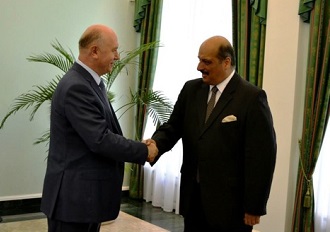India, Russia reaffirm “convergence of views” on Syria, Afghanistan, terrorism
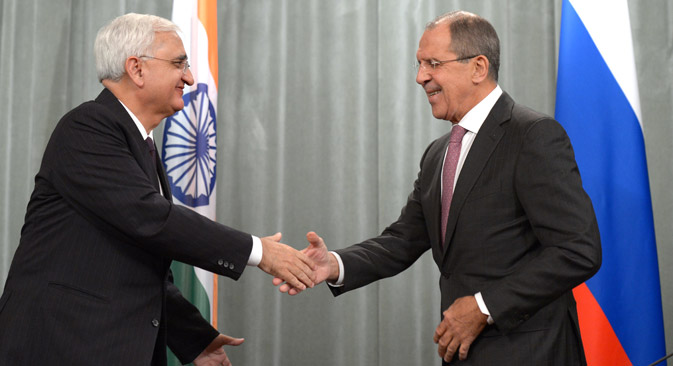
Russian Foreign Minister Sergei Lavrov (r) meets with Indian External Affairs Minister Salman Khurshid in Moscow. Source: Evgeny Biyatov / RIA Novosti
Fresh from his return from Washington after accompanying Prime Minister Manmohan Singh on his visit to the United States, last week, External Affairs Minister Salman Khurshid held talks on Wednesday with Russian Foreign Minister Sergey Lavrov in the bilateral format. Besides reviewing the bilateral relations, the regional and international issues were high on the agenda of the talks, with special attention being paid to the situation in Syria, Afghanistan and international terrorism.
Khurshid is in Moscow on a three-day visit to prepare the regular annual India-Russia summit between Prime Minister Manmohan Singh and President Vladimir Putin, later this month. He is also co-chairing the 19th meeting of Indo-Russian Inter-Governmental Commission (IRIGC-TEC) on October 3-4, with his Russian counterpart, Deputy Prime Minister Dmitry Rogozin, at the Hotel President. After the talks, the two sides will sign a protocol on the results of the meeting.
After their talks on late Wednesday evening, Khurshid and Lavrov held a joint press conference at the Foreign Ministry Guest House, in the city centre, at which they summed up the results of the meeting, reaffirming the two countries’ convergence of views on all the topical regional issues, in their neighbourhoods, West Asia and the North Africa.
“We reviewed wide-ranging aspects of bilateral relationship, including the coming annual summit. We also discussed global and regional developments and questions of our concern with a very considerable convergence of our views and determination to work together,” Khurshid told reporters.
Stressing that continuing scourge of terrorism is an issue of great concern for both New Delhi and Moscow, Khurshid said that the two sides strongly condemned terrorism in all forms and manifestations and agreed that there is no justification whatsoever for any terrorist acts, anywhere.“The continuing scourge of terrorism is a matter of great concern to both of us and to the whole world. And we strongly condemn terrorism in all forms and manifestations and agree there is no justification whatsoever for any acts of terrorist acts,” the External Affairs Minister said, adding, “In this context, we are acting both bilaterally and in the UN and in the SCO (Shanghai Cooperation Organization).
“In this context, we have our shared views on developments in Afghanistan and both of us shared that terrorism not only endangers security and civility for Afghanistan itself but also for the region and globally,” he noted.
“We have also supported the joint Russia-US framework agreement for the elimination of Syria’s chemical weapons and appropriate efforts by Russia towards securing a peaceful resolution of the Syrian conflict,” Khurshid pointed out.
For his part, Lavrov said that situation in the Middle East, Afghanistan and North Africa directly affects the national interests of Russia and India.
“Cooperation between Moscow and New Delhi in the normalization of the situation in these Regions was one of the topics discussed at the meeting,” he said.
Lavrov said that Russia and India are concerned over a possibly worse situation in Afghanistan after the withdrawal of the US-led troops in 2014 and intend to pool the efforts to ward off the threats coming from that country.
“We are in solidarity with our Indian friends that we should continue to negotiate closely our approaches to what is happening in Afghanistan and around the country, particularly with due account of the factor of 2014, as the main forces of the international contingent will be withdrawn from that country by the end of the year 2014,” he added.
“We are concerned over the prospect that the situation in that country will continue to deteriorate and the prospect that the threats will be spreading more and more actively outside Afghanistan,” Lavrov said, noting that Russia and India intend to continue to give assistance to Afghanistan “as a peaceful, independent country, free of terrorism and drug crimes.”
On Syria, he said he was hopeful that the initial measures to convene the Geneva-2 conference on Syria would be started shortly. “We would like to convene the Geneva-2 conference as soon as possible to allow Syrians themselves to agree on measures to implement the Geneva communiqué,” he said.
Answering a question about India’s full membership of the SCO, Lavrov said that the regional security group will certainly benefit from the full membership of India. Currently India has an observer status in the organization.
“We believe that the time has come,” he said. “Leaders of SCO member-states have adopted the relevant decisions, tasks were set to prepare a set of regulations that will contain the criteria for membership.”
For his part, Khurshid said that India is interested in full membership of the SCO. “For us it is very important,” adding “We are committed to this. We hope Russia will support India’s case.”
Related:
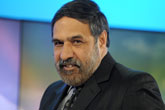
Core areas to improve trade identified at Indo-Russian trade forum
On the concerns in a section of Russian media that burgeoning India-US ties in the fields of defence and civilian nuclear energy will adversely affect the special, privileged strategic partnership between India and Russia, Khurshid said : “Anyone who thinks this does not know how deep, how vast and how strong our relationship with Russia is.”
“I think, there is no reason whatsoever for anyone at all in Russia to think that our relationship which is time-tested, which is historic and which we consider intrinsically valuable and wonderful can be undermined by anything happening in the world,” he said.
At the same time, he clarified that the world was changing very fast and everything including relationship, organizations, new structures of advanced economics and strategic matters were constantly evolving in the world.
“But it is a matter of great satisfaction that we shared confidence in each other, we shared aspirations and we therefore shared our destiny and I think, there is no reason whatsoever for anyone to see that there could be any possibility of tilt (towards US),” he said.
Dadan Upadhyay is a senior Indian journalist based in Moscow.
All rights reserved by Rossiyskaya Gazeta.
Subscribe
to our newsletter!
Get the week's best stories straight to your inbox
